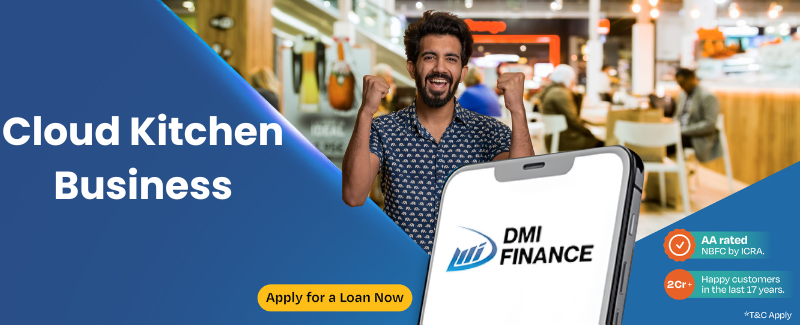- Published on: 23 Nov 2025
- Last updated on: 27 Nov 2025
- Post Views: 2571


Cloud kitchens provide food only through delivery or takeout methods. Instead of customers dining at their location, they order directly from the operator’s website or through an aggregator/online delivery platform. This market is projected to grow to ₹25,207 crore by 2030.
This offers many individuals profitable business ideas they can start with minimal investment. However, it all starts with creating a detailed cloud kitchen business plan. In this blog, we will understand what a cloud kitchen business is and why you need a cloud kitchen business plan.

A cloud kitchen, also known as a ghost kitchen, virtual restaurant, or dark kitchen, is a type of food business in which meals are prepared to be delivered through online orders only. Unlike traditional restaurants, cloud kitchens do not need a dining area or wait staff. They are running out of commercial kitchens that are designed to be efficient and deliver food online.
Orders are usually placed via apps such as Swiggy, Zomato, Uber Eats, or a delivery service of a brand. This cloud kitchen business model enables entrepreneurs to concentrate on the quality of food and speed.
Opening a cloud kitchen is a lucrative, scalable business opportunity. Here are all the reasons why you must start a cloud kitchen business:

Here is how you can create a cloud kitchen business plan:
1. Executive Summary
2. Define Your Concept
3. Menu Planning & Pricing
4. Choose the Right Location
5. Obtain Mandatory Licences
6. Setup and Equipment
7. Marketing and Brand Awareness
Typically, setting up a small-scale cloud kitchen costs anywhere from ₹5 lakh to ₹15 lakh, depending on its size and location. Generally, cloud kitchen costs include:
| Component | Estimated Cost |
| Kitchen rent (Monthly) | ₹30,000 – ₹70,000 |
| Equipment and utensils | ₹2 lakh – ₹5 lakh |
| Licenses and permits | ₹25,000 – ₹50,000 |
| Technology (POS, software) | ₹15,000 – ₹50,000 |
| Initial raw materials | ₹50,000 – ₹1,00,000 |
| Packaging materials | ₹20,000 – ₹50,000 |
| Marketing and branding | ₹30,000 – ₹1,00,000 |
| Miscellaneous | ₹25,000 – ₹75,000 |
| Total Estimated Setup Cost | ₹4 lakhs – ₹9 lakhs |

Here are the key risks associated with the cloud kitchen business you must consider:
After establishing operational stability at your business, you can begin to grow and expand efficiently. Here is how you can scale your business:

The cloud kitchen is revolutionising the food industry in India and offering entrepreneurs an idea to start a profitable business. The rising demand for online food delivery and growing consumer comfort present a golden opportunity for new food brands.
However, once you start the cloud kitchen business, you will need funds to scale it up. At DMI Finance, we offer cloud kitchen business loans of up to ₹25 lakh to help you scale your business. Apply for a business loan and get funds for all necessary equipment, expansion, and stocks.
1. How much does it cost to start a small cloud kitchen in India?
The costs of setting up a basic cloud kitchen run between ₹5 lakh and ₹15 lakh, including the cost of renting space, buying equipment, licensing fees, and marketing.
2. Which licenses are required to operate a cloud kitchen in India?
You require an FSSAI (Food Safety and Standards Authority of India) Registration/License, a GST (Goods and Services Tax) Registration, a Fire Safety Certificate, and a Shops and Establishment Act Registration to start a cloud kitchen business.
3. How can I get a business loan to expand my cloud kitchen?
At DMI Finance, we offer a business loan of up to ₹25 lakh to help you scale and expand your business. We follow a completely digital process for business loan approval to ensure you have timely access to funds.
4. Are cloud kitchens profitable in India?
Yes. Lower rental costs, lower labour costs, and lower utility costs mean higher profit margins when compared to traditional restaurants.
5. Are cloud kitchen business loans collateral-free?
As a leading NBFC in India, we are committed to offering collateral-free loans of up to ₹25 lakh without providing any asset, property or security.
6. Can I run multiple brands from one cloud kitchen?
Yes, many operators run multi-brand kitchens (e.g., one brand for biryani, another for pizza) from the same facility using shared resources.
7. How to choose the best location for a cloud kitchen?
The most desirable location for a cloud kitchen would be an area that has access to a major delivery hub, is located in a highly populated urban region, and has low rental costs. It must be within a 20-30 minute drive time to a cluster of residential and/or office developments.
8. What is the minimum credit score needed to get a loan from DMI Finance?
In general, a credit score of 700 or higher will increase the likelihood of approval for a business loan from DMI Finance.
9. What is the best way to promote your cloud kitchen?
Here is how you can promote your cloud kitchen:
10. How many days does it take to approve a loan for a cloud kitchen setup?
DMI Finance approves business loans within 2-7 days, whereas traditional banks could take 7-30 days (depending on documentation & verifications).
Disclaimer: The business ideas shared in this blog are based on research and trends. DMI Finance does not recommend or guarantee it. Starting a business involves risk—please use your own judgment and discretion. DMI Finance is not liable for any loss or outcome resulting from actions taken based on this content.


